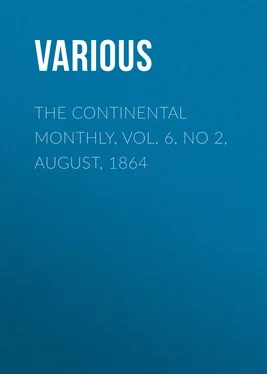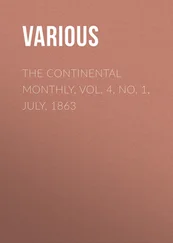Various - The Continental Monthly, Vol. 6, No 2, August, 1864
Здесь есть возможность читать онлайн «Various - The Continental Monthly, Vol. 6, No 2, August, 1864» — ознакомительный отрывок электронной книги совершенно бесплатно, а после прочтения отрывка купить полную версию. В некоторых случаях можно слушать аудио, скачать через торрент в формате fb2 и присутствует краткое содержание. Жанр: foreign_antique, periodic, Языкознание, Политика, foreign_edu, на английском языке. Описание произведения, (предисловие) а так же отзывы посетителей доступны на портале библиотеки ЛибКат.
- Название:The Continental Monthly, Vol. 6, No 2, August, 1864
- Автор:
- Жанр:
- Год:неизвестен
- ISBN:нет данных
- Рейтинг книги:4 / 5. Голосов: 1
-
Избранное:Добавить в избранное
- Отзывы:
-
Ваша оценка:
- 80
- 1
- 2
- 3
- 4
- 5
The Continental Monthly, Vol. 6, No 2, August, 1864: краткое содержание, описание и аннотация
Предлагаем к чтению аннотацию, описание, краткое содержание или предисловие (зависит от того, что написал сам автор книги «The Continental Monthly, Vol. 6, No 2, August, 1864»). Если вы не нашли необходимую информацию о книге — напишите в комментариях, мы постараемся отыскать её.
The Continental Monthly, Vol. 6, No 2, August, 1864 — читать онлайн ознакомительный отрывок
Ниже представлен текст книги, разбитый по страницам. Система сохранения места последней прочитанной страницы, позволяет с удобством читать онлайн бесплатно книгу «The Continental Monthly, Vol. 6, No 2, August, 1864», без необходимости каждый раз заново искать на чём Вы остановились. Поставьте закладку, и сможете в любой момент перейти на страницу, на которой закончили чтение.
Интервал:
Закладка:
Yet, in another point of view, this same strife for wealth is one great secret of American prosperity and progress. It is the motive power to that energy which has peopled the wilderness, erected as if by magic a mighty republic among the savage wilds, and, above all, spread American ideas, and with them the germ of human liberty, over the whole broad earth. To this spirit of greed upon our shores the Old World owes much of its advancement and most of those useful inventions which are fast revolutionizing humanity itself. But we are not considering it in this light; we are viewing it in its moral aspect, that respect in which it most strongly affects true civilization, which must soon fall away and lapse into the condition of the ages long past, if it be not sustained by an enduring moral and religious element. The moral advancement must keep pace with the intellectual, else the latter will some day reach that point where extremes meet, and have its weary journey to commence again.
It is to be hoped that this evil is already on the wane. It is to be hoped that the present stirring up of our society from its uttermost depths, with its consequent exploding of worn-out theories, which have hitherto held their places only through our national lethargy—with its sweeping away of old-time prejudices, and mingling together of elements which have hitherto existed distinct and aloof from each other, will result in bringing true merit to the surface, in awakening our people to a loftier appreciation of the good and the true, thereby establishing a higher moral standard among us; that purer motives will henceforth actuate our society. The fears which are entertained by some that the present war will prove a severe shock to our civilization, are not sustained by the facts which are everywhere appearing around us. The frequent demands upon the generosity and forbearance of a great people, the constant calls for the exercise of the noblest qualities, the most self-sacrificing devotion, and that too in support of a great principle rather than of any present material interest, the very necessity for an exalted civilization and intellectual development on the part of the masses, which shall enable them to see in that principle the groundwork of all their future well-being, both as regards material prosperity and political position, are constantly bringing before the people, in a clearer light than ever before, the blessings of honor and uprightness, the necessity of national purity, and developing a moral element in our midst, whose good effects will far outbalance the ephemeral and spasmodic immorality and vice which a state of war usually engenders. Our people are becoming acquainted with those blessings of individual well-doing and those principles of philanthropy to which they have for so long been comparative strangers. And it is this, together with the unveiling, through the present convulsion, of those errors, both in our political system and in our society, which have so nearly proved our ruin, which will make this war in very truth the greatest blessing that has ever befallen us. And if this moral progress shall be such and so great as to throw down the golden calf from his throne and make the place of honor the reward of true merit alone, then shall we have cause, for the remotest generations, to thank God for this seeming calamity which has fallen upon us.
And these same facts, standing out as shining lights in the darkness, tend to show that we are, after all, not quite so sordid as we seem; that, with all our worship of the money god, there is yet, away down in the great American heart, a wealth of strong, true, generous feeling, ready at the first call of sorrow and of suffering to spring forth and scatter its golden blessings even beyond the seas. It is not alone that, years ago, when we were at peace and at the height of prosperity, many ships left our shores laden down with food, the voluntary contributions of the American citizen to his starving brethren of the Emerald Isle; though this of itself was enough to place our civilization on a level with that of the most polished nation of the Old World. But even now, when we are struggling for our very existence, when every energy and every material resource is being exerted to stem the tide of internal dissensions and crush out the hydra of internal treason; at a time when the mother country has gone to every length short of open war to aid and assist those who are striving for our downfall, and her press is exhausting every epithet of vituperation and scurrilous abuse of us, who are battling so earnestly in our own defence, and who are entitled by every truth of human nature to her warmest sympathy—a press which, adopting the phraseology of its Secession friends and allies, scruples not to place the civilization of the slaveholding States far in advance of that of the 'Northern mudsills'—even now, when the cry of the starving operatives of the English mills comes to us across the water, forgetting for the time all the abuse and maltreatment we have received, all the enmity and bitter hostility which the traitorous perfidy of England has engendered, more than one full-freighted vessel has left our ports bearing grain to those whom their own proud aristocracy is either powerless or too niggardly to sustain. Is this not evidence of a civilization considerably advanced beyond any which history has yet recorded?—a civilization based upon the golden rule of Christianity, and upon that still more precious command: 'Love those that hate you, and do good to those that persecute you.' For it is in its moral aspect that every civilization must in the end be judged; and that society which develops such noble principles and feelings as these, which manifests itself in this higher region of spiritual excellence, in the exercise of these finer feelings of the heart, is certainly nearest to perfection, in that it follows most closely the law of God, the truths of divine revelation. When instances such as these occur on the part of any of the older nations of the world, it will do for them to boast of a civilization superior to ours; but until their faith is shown by their works, suffering humanity the world over will accord to us the palm. Nor will it answer to ascribe to us an unworthy motive in this matter—a desire to win credit in the eyes of the world. An individual might, with some degree of plausibility, fall under such an imputation, but a great people does not move spontaneously and unitedly in one direction from such a motive, since none but a pure and just principle can produce unity in the masses. Such an unworthy and degrading motive is the property of individuals, not of nations, even if it were possible for such an idea to be conceived at one and the same time by a multitude of minds. No! it was the spontaneous expression of a deep and pervading principle of American society—of American humanity—a free outpouring of the American heart; and as such it will stand upon the page of history as the evidence of a civilization behind none of its age.
Nor is this the only mark of the moral awakening of our people. Instances are every day appearing in our midst of this truest of charity, not the least of which are the 'wood processions' of the Western cities and towns; those long lines of wagons laden with fuel and provisions for the families of the absent soldiers, whose sole object and motive is the comfort of those whose protectors and supporters are sustaining the country's honor in the field; evidences more striking than the founding of charitable institutions or benevolent societies, since the latter may, and too often does, arise from the most selfish and vainglorious motive, while in the former the individual is lost in the many who press eagerly to bear their part in a noble work, in this spontaneous outpouring of true and heartfelt benevolence. From this same spirit arises the wonderful success which attends the efforts of sanitary commissions and soldiers' aid associations in alleviating the sufferings and softening the privations of our soldiers in the field. With such evidences constantly appearing before our eyes of the deep and noble feelings of the American heart, who can doubt that our civilization is a progressive one, our enlightenment equal? Who can doubt the capacity of the American people for good, or look with foreboding upon our future?
Читать дальшеИнтервал:
Закладка:
Похожие книги на «The Continental Monthly, Vol. 6, No 2, August, 1864»
Представляем Вашему вниманию похожие книги на «The Continental Monthly, Vol. 6, No 2, August, 1864» списком для выбора. Мы отобрали схожую по названию и смыслу литературу в надежде предоставить читателям больше вариантов отыскать новые, интересные, ещё непрочитанные произведения.
Обсуждение, отзывы о книге «The Continental Monthly, Vol. 6, No 2, August, 1864» и просто собственные мнения читателей. Оставьте ваши комментарии, напишите, что Вы думаете о произведении, его смысле или главных героях. Укажите что конкретно понравилось, а что нет, и почему Вы так считаете.












